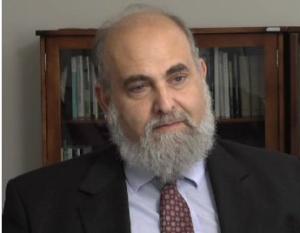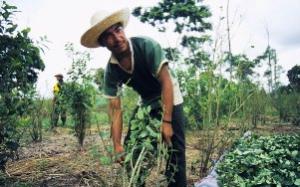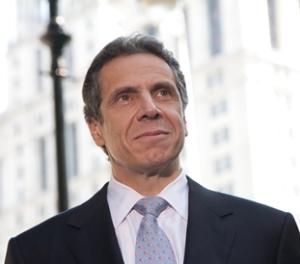Despite only one state legalizing marijuana so far this year, for the Marijuana Policy Project, the glass is half full. We think so too.
The pressure is mounting on the United Nations to do something about the bloody drug repression in the Philippines.
Oregon's wide-open marijuana licensing system has created a mountain of marijuana, and that's driving prices down, down, down.
A federal bill to clear the way for more medical marijuana research has been filed, a fight is brewing over Utah's grower licensing decisions, and more.
A Florida sheriff's deputy breaks bad, a New Jersey cop probably shouldn't have done heroin on the job, and more.
The CDC reports that the overdose crisis may have peaked in 2017, El Chapo is sentenced to life in prison for exporting tons of cocaine and other drugs to the US, North Carolina lawmakers want to ban smokable hemp, and more.
More than 2,000 federal drug prisoners walk free today under First Step Act reforms, the drug czar touts declining drug overdose numbers and blames Obama, Texas prosecutors balk at low-level pot prosecutions now that hemp is legal, and more.
Democratic presidential contenders stake out marijuana and criminal justice positions, a North Dakota legalization initiative is approved for signature-gathering, Vancouver wants a safe drug supply of illicit opioids, and more.
A leading academic voice on drug and criminal justice policy has left us, skyhigh Virginia pot arrests prompt calls for reform, Brazil's rightist government moves to silence critical voices on drug policy, and more.
A marijuana banking bill gets a Senate committee hearing, a new poll finds pot is popular progressive policy plank, Juneau approves on-site marijuana consumption, and more.
Arkansas sees yet another marijuana legalization initiative filed, the Florida legalization initiative campaign nears a milepost, Colombian legislators seek to block their rightist president's repressive drug policies, and more.
Traffic stops in Vermont's largest city declined precipitously after marijuana legalization, a broad coalition urges the FDA to limit a ban on felons participating in the hemp industry, Florida's hemp legalization law is making it almost impossible to prosecute pot possession offenses, and more.
New York's governor signs a bill deepening pot decriminalization, a new congressional bill would let students with marijuana possession convictions get access to federal aid -- if they complete drug treatment -- and more.
Hemp and CBD are now legal in Ohio, a federal agency has proposed letting people with low-level drug convictions work in credit unions, the Trump administration moves to tighen up opioid prescribing for federal employees, and more.
At the beginning of 2019, hopes were high that as many as four or five states would legalize marijuana through the legislative process this year. That didn't happen, and the failure of both New Jersey and New York to get it done was especially dispiriting, given that governors and legislative leaders alike said they supported it.
As we pass the mid-point of the year, and most state legislatures have adjourned, it's looking increasingly like we will have to settle for Illinois having gotten it done in 2019. But that's a glass half-empty attitude. In
a report released Monday, the Marijuana Policy Project (MPP) sees a lot of progress this year.
"Virtually every legislature in the country is taking a close look at its marijuana policies, and many have adopted significant reforms in 2019," MPP director of state policies and lead report author Karen O'Keefe said in a press release accompanying the report. "Not a single legislature moved to repeal or roll back a medical cannabis or legalization law. Particularly with the first-of-its-kind legalization victory in Illinois, 2019 has been a milestone year for MPP and our movement."
One state, though, was called out for bucking the forward trend. MPP identified South Dakota as "the most stagnant," noting that it "has the dubious distinction of being the only state where there has been no forward progress on marijuana policies in 2019. The state lacks a medical cannabis, decriminalization, and legalization law, and no legislator even put forth a proposal to improve marijuana policies this year. While the legislature did pass a hemp bill in 2019, Gov. Kristi Noem (R) vetoed the modest measure, and the legislature could not muster the votes for an override. The Mount Rushmore State is also the only state that criminalizes 'internal possession' -- meaning a person can legally use marijuana in Canada but face jail time if they test positive in South Dakota."
Still, calling it "a historic year for marijuana policy and the movement," MPP pointed to 27 states where legalization bills were filed, decriminalization in three states, and progress in Congress, as well as incremental positive changes, such as expanding existing medical marijuana programs or adding on-site consumption to an existing legalization law.
And MPP even created a Top 10 2019 pot policy achievements. Here they are:
- Marijuana Legalization in Illinois. On June 25, Illinois Gov. J.B. Pritzker made history by signing into law the Cannabis Regulation and Tax Act (CRTA) The Illinois House and Senate had approved the CRTA in late May. Adults 21 and older will be allowed to possess and purchase cannabis starting on January 1, 2020.
- US House Prevents Federal Intervention.For the first time ever, the US House of Representatives approved a budget rider to prevent federal interference with adult-use marijuana laws.
- Decriminalization in New Mexico. New Mexico decriminalizes marijuana, reducing the penalty for up to half an ounce of marijuana to a $50 civil fine.
- Medical Marijuana in Georgia. Georgia approved in-state production of medical marijuana with up to 5% THC.
- Decriminalization in North Dakota. North Dakota reduced the penalty for up to half an ounce of marijuana from a misdemeanor to an infraction carrying a maximum fine of $1,000.
- Decriminalization of Very Small Amounts in Hawaii. Hawaii reduced the penalty for up to three grams of cannabis from up to 30 days in jail and a fine of up to $1,000 to a $130 civil fine.
- On-Site Consumption in Colorado. Colorado legalized and regulated cannabis hospitality -- such as cannabis cafes -- in localities that opt in.
- Home Delivery in Colorado. Colorado legalized home delivery.
- Employment Protection in Nevada. Nevada prohibited most employers from conducting pre-job offer drug testing.
- Guam Legalizes Marijuana. The US territory of Guam legalized and regulated marijuana for adults' use.
back to top
Three years into the administration of Philippines strongman President Rodrigo Duterte and despite rising international condemnation, Duterte's bloody war on poor drug users continues unabated, with a pattern of unlawful executions under the guise of police sting operations, the human rights group Amnesty International said in a report released Monday.

Rodrigo Duterte's Philippines drug war is drawing the ire of Amnesty International. (Creative Commons)
The report, "
'They Just Kill:' Ongoing Extrajudicial Executions and Other Violations in the Philippines' 'War on Drugs,' comes as the United Nations Human Rights Council is expected to vote on a resolution later this week calling for an investigation into the Philippines killings. Amnesty is calling on the council to approve that resolution.
"Three years on, President Duterte's "war on drugs" continues to be nothing but a large-scale murdering enterprise for which the poor continue to pay the highest price," said Nicholas Bequelin, Amnesty's Regional Director for East and Southeast Asia. "It is time for the United Nations, starting with its Human Rights Council, to act decisively to hold President Duterte and his government accountable."
[Update: The Human Rights Council adopted the resolution on July 11.]
Philippines police accept responsibility for more than 6,000 killings, saying they came in raids in which armed suspects fought back against police, but the actual number of killings, many conducted by shadowy vigilante groups suspected of links to the police may be twice or three times that figure. Opposition legislators said in February 2018 the death toll had reached 20,000.
Amnesty said the true number may never be known because "deliberate obfuscation and misinformation" from authorities makes it impossible to get an accurate tally of the killings, which targeted poor and marginalized communities that lack the means to challenge police misconduct and abuses.
It's not just the number of killings that is in doubt, but the circumstances surrounding them. While police typically claimed self-defense, witness and other information developed by Amnesty suggests a pattern of "extrajudicial executions," a polite way of saying murders by police. The claim that police were only defending themselves "doesn't meet the feeblest standards of credibility," Amnesty concluded.
A Filipino forensic expert interviewed by Amnesty said that police reports of "buy-bust" operations she had examined did not meet the minimum standards of plausibility: "It's so consistent, it's a script. In fact, when you see the report, it looks like a template," she said.
As Amnesty reported:
In an all-too-typical case, police claimed Jovan Magtanong, a 30-year-old father of three, fired at them, and that they recovered a .38 caliber pistol and baggies of illegal drugs from the scene of the incident. Witnesses said he was sleeping alongside his children when officers knocked on his house door asking for another man. Jovan's family said he did not own a gun and had not used drugs for over a year.
"They killed him like an animal," a family member told Amnesty.
Amnesty's latest report builds on an January 2017 investigation showing police had systematically targeted mostly poor and defenseless people across the country, planting "evidence," recruiting paid killers, stealing from the people they kill, and fabricating official reports. That report centered on metro Manila, then the epicenter of the killings, but the new report follows the pattern of killings to Bulacan province in Luzon, the new hotbed of drug war atrocities.
Amnesty examined 27 killings there during 20 incidents, 18 of which were official police operations. Based on witness accounts and other information, it concluded that half were extrajudicial executions. Amnesty said it couldn't develop enough information to qualify the other deaths, but said they pointed broadly to previous patterns of executions.
Amnesty also highlighted the role of "watch lists" of people in communities suspected of using or selling drugs. The "watch lists" are compiled by local officials under pressure to show results in the war on drugs by collecting the names of suspected drug users and sellers. "These lists effectively serve as guides for police of people to arrest or kill," Amnesty said. Amnesty "views these lists as unreliable, illegitimate, and unjustifiable," the group said.
"The Duterte administration has created a deadly numbers game where officials must manufacture lists and monitor them, regardless of whether the individuals on it actually use or sell drugs. This insatiable and vicious system rewards blind compliance and murder," said Nicholas Bequelin.
And the police act with impunity. Of all the killings acknowledged by the police, only one, the murder of 17-year-old Kian delos Santos in August 2017, which generated global media attention, actually saw police officers punished. But the man in charge of the police there, Senior Superintendent Chito Bersaluna, suffered only a period of "administrative leave" and is now working the drug war in Bulacan.
"The transfer of senior police officials to regions where killings then surged is an alarming indicator of impunity," said Bequelin. "The Duterte administration's continuing efforts to deny and deflect responsibility are nothing short of mendacious."
The achingly callous attitude of Philippines drug warriors toward their fellow citizens was made clear last week when Ronald Dela Rosa, now a senator but earlier the metro Manila police chief and lead conductor of Duterte's drug war, defended the killing of a three-year-old girl in a drug raid near Manila.
"Shit happens," he said as he accused the girl's father of using her as a human shield.
"It is not safe to be poor in President Duterte's Philippines," said Bequelin. "All it takes to be murdered is an unproven accusation that someone uses, buys, or sells drugs. Everywhere we went to investigate drug-related killings ordinary people were terrified. Fear has now spread deep into the social fabric of society."
Duterte and his henchmen have reacted to the International Criminal Court by leaving it, and have stonewalled attempts by domestic watchdogs to investigate their drug war crimes. Now it's time for the UN to step up.
back to top
Drivers heading north on I-5 in southern Oregon not only enjoy the region's towering mountains and evergreen forests, they are also treated to the occasional enticement. At various points along the way, giant billboards appear, shouting out messages like "NEED WEED? Exit Here" and the succinct "MARIJUANA! This exit."

The popular Blue Dream strain is available for $2 gram or $45 an ounce in one Oregon shop. That's not unusual (CP/Flickr)
And when motorists pull off the highway and wander into those shops, they're finding weed at unbelievable prices. One shop offered grams of the popular Blue Dream strain for $2, and bargain-hunting buyers could walk out with an ounce for only $45. A number of other strains were also available for $100 an ounce or less.
It's no fluke. Walk into any marijuana store in Oregon, and you'll find perfectly acceptable grams packages for $2 or $3. Yes, it's typically outdoor marijuana, which store clerks will tell you goes for less because it doesn't get the same level of care and attention that indoor or greenhouse weed does. But the real reason is that outdoor weed gets one key input -- light -- for free from the sun. At $2 gram, indoor and greenhouse growers are barely recovering production costs; outdoor growers have a little more wiggle room.
If you're feeling particularly Californian, you can still pay $10 or $12 a gram if you want, but that $2 weed is going to get you just as high as that $12 weed. And state regulations let you know the THC content of anything you buy, including high octane strains at bargain basement prices.
Oregon's ridiculously cheap pot prices are a boon to consumers -- and the state's tax revenues. With retail prices falling by half last year, consumption jumped by around 30% over the previous year, driving tax revenues past the $94 million mark by year's end. But while marijuana consumers are happy and pot tax coffers are brimful, the situation is not so great for the state's legal pot producers.
Unlike other early legalization states, such as Colorado and Washington, Oregon placed few limits on who could grow legal commercial marijuana, and the result has been overgrowth of epic proportions. According to the state Oregon Control Commission (OLCC), the agency that regulates marijuana, at the end of the fall harvest last year, Oregon produced enough legal marijuana to supply the state's needs for the next six years. You don't need a PhD in economics to understand how the law of supply and demand is driving prices down.
And OLCC has the raw data to show it: The wholesale price of indoor marijuana peaked at around $2,200 a pound in late 2017 before steadily declining to its current level of about $1,000 a pound. For outdoor marijuana, which accounts for the vast majority of Oregon production, the price peaked at about $1,500 in late 2016, declined to about $1,000 a pound in late 2017, and slid even further to under $500 a pound after last year's harvest.
For the OLCC, the glut is a sign that the system is working: "Oregon oversupply is a sign that policy choices made to attract illegal and grey market producers into the new commercial system have been successful; this was a start-up challenge Colorado and Washington didn't have to face," the regulators noted. "Oregon medical marijuana growers had long been suspected of diverting into the illegal market so it was important to attract these well-established producers into the OLCC's new regulated recreational marijuana program. To entice medical as well as formerly illegal growers into Oregon's legal market the state lowered the barriers to entry with low license fees and taxes and chose not to limit the number of licenses."
Still, the OLCC conceded that while that approach "fulfilled the immediate objective" of absorbing growers into the legal market," it has also "led to industry churn as businesses face mounting cost pressures and attempt to position themselves for the long term."
Now, fearing that "industry churn" could lead some businesses to try to sell their products on the black market or outside the state, lawmakers have moved to rein in production. This year, lawmakers enacted legislation that for the first time allows the OLCC to stop issuing new production licenses when supply exceeds demand.
They also moved to seek broader markets for the state's legal marijuana, passing a bill that would allow growers to sell their product out of state. But that isn't going to happen without federal approval, and there's no sign of that in the immediate future. Still, two Democrats who represent Oregon in Congress, Sen. Ron Wyden and Rep. Earl Blumenauer, last month filed a bill that would allow for interstate commerce between states with legal marijuana programs.
Some legal pot farmers have gone bankrupt, others have just left the business, but a sizeable number have now switched to yet another cannabis product: hemp. In 2015, there were only 13 registered hemp growers in the state; now there are more than 750. And the number of acres devoted to hemp production jumped dramatically as well, from 105 acres in 2015 to more than 22,000 now. That's because hemp can be exported since it is now legal under federal law, and because of the boom in CBD products, which can be derived from low-THC hemp as well as from marijuana. With those push factors, the price of hemp flowers, now going for around $350-$700 a pound, is getting close to and sometimes surpassing the price of outdoor marijuana.
Oregon's legal marijuana market continues to evolve, and, as the OLCC put it, the industry will continue to churn. There are going to be winners and losers among the producers, but for Oregon marijuana consumers, these are the best of times.
back to top
A federal bill to clear the way for more medical marijuana research has been filed, a fight is brewing over Utah's grower licensing decisions, and more.
NationalBipartisan Lawmakers File Federal Bill to Break Medical Marijuana Research Logjam. A bipartisan group of lawmakers led by Rep. Earl Blumenauer (D-OR) has filed the Medical Marijuana Research Act, which aims to accelerate medical marijuana research by creating a less cumbersome registration process, reforming production and distribution regulations, and allowing for private manufacturing and distribution of marijuana for research purposes. "Forty-seven states have legalized some form of cannabis, yet the federal government is still getting in the way of further progress on the potential for research," said Blumenauer.
Mississippi
Mississippi Medical Marijuana Initiative Still Looking for Signatures. The Medical Marijuana 2020 campaign is still hunting signatures to qualify its medical marijuana initiative for the November 2020 ballot. The campaign needs to turn in some 86,000 valid voter signatures by October and says it has already gathered more than 100,00 raw signatures.
Utah
Utah Regulators Announce Choice of Applicants to Grow Medical Marijuana. The state Department of Agriculture and Food announced Friday it has chosen eight applicants that will be licensed to grow medical marijuana in the state. "Half of the awardees already have existing businesses in Utah and the other half are out of state but have Utah ties. All grows will be located in Utah. Seven of the proposed sites are in rural areas and one is in an urban area," Kerry W. Gibson, commissioner of the Utah Department of Agriculture and Food, said in a statement. The agency could have awarded up to 10 licenses, but said it wanted to avoid an oversupply of product.
Utah Grower Licensing Decision Challenged. After the state Department of Agriculture awarded only eight out of a possible 10 grower licenses, a rejected applicant has challenged the decision through an administrative appeal, claiming that the state granted licenses to unqualified growers and could create a medical marijuana shortage that forces patients to resort to the black market. The appeal will likely delay the rollout of medical marijuana because licenses cannot be finalized until appeals are resolved.
[For extensive information about the medical marijuana debate, presented in a neutral format, visit MedicalMarijuana.ProCon.org.]
back to top
A Florida sheriff's deputy breaks bad, a New Jersey cop probably shouldn't have done heroin on the job, and more. Let's get to it:
In Buena Vista, Colorado,
a state corrections officer was arrested July 2 after he was caught bringing a burrito stuffed with drugs to work. Guard Trevor Martineau, 27, went down at the Buena Vista Correctional Facility following a multi-agency investigation sparked by an inmate who snitched him out. Martineau admitted he had drugs in his lunch bag when confronted, and authorities found the burrito stuffed with "roughly 91 grams of meth, 26 grams of heroin and 46 strips of suboxone" -- in addition to "10 strips of buprenorphine naloxone, marijuana wax and six small thumb drives." Martineau admitted he was paid $1,000 to pick up the drugs. Authorities said they found $960 of that at his house. He is charged with first-degree introduction of contraband and three charges of unlawful possession of a controlled substance. He was also charged with one count each of unlawful distribution of meth, heroin and Suboxone.
In Crawfordsville, Florida, a former Jackson County sheriff's deputy was arrested last Wednesday on charges he routinely pulled drivers over for minor traffic infractions, planted drugs in their vehicles, and then arrested them on bogus drug charges. Former Deputy Zachary Foster displayed a pattern of pulling drivers over, claiming he smelled marijuana, then planting baggies of methamphetamine in the cars. Prosecutors have now dropped nearly 120 cases he brought. He is charged with felony counts of racketeering, official misconduct, fabricating evidence, possession of a controlled substance and false imprisonment. He also faces misdemeanor charges of perjury, possession of a controlled substance and possession of drug paraphernalia.
In Franklin Township, New Jersey, a Franklin Township police officer pleaded guilty last Friday to heroin possession and driving while impaired after he suffered a heroin overdose in his patrol car in April. Matthew Ellery had to be revived by a colleague who administered naloxone. As part of the plea deal, Ellery agreed to resign from the police force.
back to top
The CDC reports that the overdose crisis may have peaked in 2017, El Chapo is sentenced to life in prison for exporting tons of cocaine and other drugs to the US, North Carolina lawmakers want to ban smokable hemp, and more.

Joaquin "El Chapo" Guzman gets life in prison, but somebody has already replaced him. (SEDENA}
More Than 100 Marijuana Businesses Urge Congress to Include Social Equity in Legalization. A coalition representing more than a hundred marijuana businesses and industry associations sent a letter to the congressional leadership Thursday, urging them to ensure that provisions promoting social equity are part of any marijuana reform legislation. The signatories said they feared people from communities that suffered a disproportionate impact from the drug war would be "left behind because a previous [cannabis] conviction often is a disqualifying factor to become an owner or employee in the new legal 'green-rush'' and also because "they are unable to come up with the capital necessary to break into the industry."
West Hollywood Okays First Cannabis Cafe. The city of West Hollywood, California, has approved a space for what would be the first cannabis café in the city. The council Tuesday approved a business license for Lowell Farms, which promises cannabis cuisine and a smoking area. Since state law forbids the consumption of alcohol and marijuana on the same site, alcohol will not be served. The doors could open within months.
Medical Marijuana
Bipartisan Lawmakers File Federal Bill to Break Medical Marijuana Research Logjam. A bipartisan group of lawmakers led by Rep. Earl Blumenauer (D-OR) has filed the Medical Marijuana Research Act, which aims to accelerate medical marijuana research by creating a less cumbersome registration process, reforming production and distribution regulations, and allowing for private manufacturing and distribution of marijuana for research purposes. "Forty-seven states have legalized some form of cannabis, yet the federal government is still getting in the way of further progress on the potential for research," said Blumenauer.
Hemp
North Carolina House Committee Votes to Define Smokable Hemp as Marijuana. Acting at the behest of law enforcement, the House Judiciary Committee on Wednesday amended SB 352 to classify smokable hemp as a controlled substance like marijuana. The move came after police complained that allowing smokable hemp would make enforcing laws against marijuana smoking unenforceable and that it would cause police to lose probable cause for vehicle searches based on the smell of marijuana smoke or a drug dog's alert. "If this bill passes without the ban, we will put 800 of our law enforcement dogs and their handlers out of business," said Rep. Jimmy Dixon (R-Duplin).
Ohio House Votes to Approve Hemp Bill. The House on Wednesday voted 88-3 to approve SB 57, which clears the way for legal hemp production in the state. The Senate had already approved the bill, but because the House amended it, the Senate voted later Wednesday to concur in those amendments. The bill now goes to the desk of Gov. Mike DeWine (R).
Drug Overdoses
CDC Says Drug Overdoses Fell Last Year for First Time in Decades. The Centers for Disease Control and Prevention (CDC) reported Wednesday that preliminary data showed nearly 68,000 drug overdose deaths last year, a 5% decline over 201, which saw a record of more than 70,000 deaths, and the first decline since the beginning of the current opioid use wave beginning in 1995. But the rate is still about seven times higher than it was then.
Law Enforcement
El Chapo Sentenced to Life in Prison. Mexican drug lord Joaquin "El Chapo" Guzman was sentenced Wednesday to life in prison plus 30 years in federal court in Manhattan. He had been convicted in February of smuggling tons of cocaine and other drugs into the US. He is headed for the federal maximum security prison in Florence, Colorado.
back to top
More than 2,000 federal drug prisoners walk free today under First Step Act reforms, the drug czar touts declining drug overdose numbers and blames Obama, Texas prosecutors balk at low-level pot prosecutions now that hemp is legal, and more.

There's a bit more room in the federal prisons today after 2,200 inmates walked free under the First Step Act. (Supreme Court)
Texas Governor Tells DAs Not to Drop Misdemeanor Marijuana Possession Cases. Gov. Greg Abbott (R) sent a letter Thursday to all county prosecutors urging them to continue to enforce state marijuana laws even though since the state legalized hemp this year prosecutors have no means of testing the amount of THC in a cannabis sample. Their current drug tests only detect the presence of THC, not whether it exceeds the 0.3%, and prosecutors in some of the state's largest counties have announced they will not prosecute small-time pot possession cases. Dallas County District Attorney John Creuzot is one of them, and he said he's not changing his mind: "I have the responsibility to protect the rights of our citizens and ensure that people are not prosecuted for possessing substances that are legal. The concentration of THC is a statutory element of an offense that we must prove to establish a person's guilt. Our office will not charge a person with a marijuana offense without a laboratory report stating that the substance has an illegal concentration of THC."
Heroin and Prescription Opioids
Trump Drug Czar Touts Progress Against Opioid Crisis. Jim Carroll, head of the Office of National Drug Control Policy (ONDCP -- the drug czar's office) gave his boss, the president, credit for an apparent decline in drug overdose deaths reported earlier this week by the Centers for Disease Control and Prevention (CDC). "This president has made this a priority since day one and we're beginning to see results. As you know, the billions of pills that were released, without any control or oversight about what was going on in the last administration has resulted in thousands and thousands of people dying," he said. Still, nearly 70,000 people died of drug overdoses last year on Trump's watch.
Sentencing Policy
More Than 2,000 Federal Drug Prisoners Walk Free Today Under First Step Act. The federal Bureau of Prisons is set to release today 2,200 inmates who had their release dates recalculated following passage of the First Step Act in December. The measure created an easier pathway for inmates to participate in programs designed to prevent recidivism and earn reductions in their sentences. It also reduced mandatory minimum sentencing for nonviolent drug offenders with the goal of accelerating the rehabilitation of criminals and improving their chances for success after release.
International
Colombia Court Upholds Ban on Spraying Coca Fields With Herbicide, but Gives Government an Out. The country's constitutional court on Thursday upheld its restrictions on the aerial spraying of glyphosate to kill coca crops, but also said spraying could be reinstated if the government met certain conditions. The country ended the spraying in 2015 after the World Health Organization linked glyphosate to cancer, and the court ratified that decision. But now, rightist President Ivan Duque wants to overturn that decision. While the court upheld the ban for now, it said it will be up to the national narcotics council to decide whether spraying can resume based on conditions it set in its 2017 ruling.
back to top
Democratic presidential contenders stake out marijuana and criminal justice positions, a North Dakota legalization initiative is approved for signature-gathering, Vancouver wants a safe drug supply of illicit opioids, and more.

Joe Biden seeks to make political amends for his past criminal justice history. (Creative Commons)
Kamala Harris, Jerry Nadler File Federal Decriminalization Bill. Sen. Kamala Harris (D-CA), a contender for the Democratic presidential nomination, and House Judiciary Committee Chair Rep. Jerrold Nadler (D-NY) have filed legislation that would decriminalize marijuana possession at the federal law, impose a 5% federal marijuana sales tax, and use some of the proceeds to fund programs that help individuals and communities disproportionately impacted by marijuana prohibition. The bill is not yet available on the congressional web site.
Arizona Attorney General Calls on Legislature to Legalize Marijuana in Bid to Avoid Initiative That Can't Be Altered by Politicians. Attorney General Mark Brnovich (R) wants the state legislature to enact marijuana legalization so that it can have a say in making any future changes to the law. Browder said he fears an industry-crafted measure winning at the ballot box. He is also concerned that if marijuana for adults is legalized by voters, it will be constitutionally protected against legislative fixes.
North Dakota Legalization Initiative Approved for Signature-Gathering. Secretary of State Al Jaeger said Monday he had approved a constitutional amendment to legalize marijuana for signature-gathering. Supporters of the effort will need to come up with 26,904 valid voter signatures by February 10 to qualify for the November 2020 ballot. A separate group is planning a statutory initiative to legalize marijuana. That group is expected to submit its petition to Jaeger late this month or next.
Criminal Justice
Joe Biden Unveils Criminal Justice Plan. Former vice president and current Democratic presidential contender Joe Biden rolled out a 21st Century criminal justice policy in a speech in New Orleans Tuesday. In it, he called for an end to the powder/crack cocaine sentencing disparity, and end to the federal death penalty, the creation of a $20 grant program to states to reduce incarceration as long as they eliminate mandatory minimum sentencing, the expansion of the Justice Department's role in rooting out institutional misconduct by police departments, and more. His rivals say it doesn't make up for what they say is Biden's role in creating and perpetuating mass incarceration.
International
Vancouver Overdose Task Force Calls for Safe Supply of Drugs. The Canadian city's overdose emergency task force is calling for expanded access to a safe supply of illicit drugs for drug users. The task force is calling on the city council to approve a motion advocating for a regulated supply of "opioids or other substances." It also calls on the federal government to "expand access to safe supply by proactively supporting all doctors, health authorities, provinces and all relevant professional colleges, including physicians and surgeons across Canada, to safely provide regulated opioids or other substances through a free and federally available pharmacare program."
(This article was prepared by StoptheDrugWar.org's 501(c)(4) lobbying nonprofit, the Drug Reform Coordination Network, which also pays the cost of maintaining this website. DRCNet Foundation takes no positions on candidates for public office, in compliance with section 501(c)(3) of the Internal Revenue Code and does not pay for reporting that could be interpreted or misinterpreted as doing so.)
back to top
A leading academic voice on drug and criminal justice policy has left us, skyhigh Virginia pot arrests prompt calls for reform, Brazil's rightist government moves to silence critical voices on drug policy, and more.

Drug reform and criminal justice scholar Mark Kleiman has died at age 68. (Creative Commons)
Virginia Marijuana Arrests at Highest Level in 20 Years. Nearly 29,000 people were arrested on marijuana charges in the state last year, the vast majority for simple possession. That figure is three times the level of 1999 and accounts for nearly 60% of all drug arrests in the state. The spike is leading to calls for decriminalization by some lawmakers, as well as state Attorney General Mark Herring (D), who last month when became the state’s highest official to call for legalizing marijuana for recreational use.
Medical Marijuana
Mississippi Medical Marijuana Initiative Still Looking for Signatures. The Medical Marijuana 2020 campaign is still hunting signatures to qualify its medical marijuana initiative for the November 2020 ballot. The campaign needs to turn in some 86,000 valid voter signatures by October and says it has already gathered more than 100,00 raw signatures.
Utah Regulators Announce Choice of Applicants to Grow Medical Marijuana. The state Department of Agriculture and Food announced Friday it has chosen eight applicants that will be licensed to grow medical marijuana in the state. "Half of the awardees already have existing businesses in Utah and the other half are out of state but have Utah ties. All grows will be located in Utah. Seven of the proposed sites are in rural areas and one is in an urban area," Kerry W. Gibson, commissioner of the Utah Department of Agriculture and Food, said in a statement. The agency could have awarded up to 10 licenses, but said it wanted to avoid an oversupply of product.
Obituaries
Criminal Justice and Drug Policy Expert Mark Kleiman Dead at 68. Longtime criminal justice and drug policy expert Mark Kleiman died Sunday of complications from a kidney transplant, his family reported. Coauthor with Jonathan Caulkins, Angela Hawken and Beau Kilmer of Marijuana Legalization: What Everyone Needs to Know, Kleiman rejected what he called a false dichotomy between legalization and prohibition, arguing for a middle ground that would end prohibition while avoiding the rise of commercially driven "Big Marijuana." His nuanced approach to drug and criminal justice reform didn't always sit well with reformers, but he was for decades a thoughtful and innovative scholar in the arena.
International
Brazil Removing Independents from Drug Policy Council. Rightist President Jair Bolsonaro is removing most non-governmental representatives from a council that sets policy on drugs. In a presidential decree Monday, he cut the size of the council in half and removed experts chosen by associations of jurists, physicians, social workers and other independent groups, leaving mostly those appointed by the government. Critics say it is a move designed to stifle dissent. It is also a continuation of an approach he has already applied to environmental and cultural affairs.
UNODC Warns of Rising Role of Organized Crime in Southeast Asia. In a report issued last Thursday, the UN Office on Drugs and Crime (UNODC) warned that transnational crime groups in the region are generating massive profits from the trafficking of drugs, people, and counterfeit goods, and are becoming increasingly aggressive. UNODC said the methamphetamine trade in particular had exploded, jumping in value from around $15 billion in 2013 to somewhere between $30 and $60 billion now.
back to top
A marijuana banking bill gets a Senate committee hearing, a new poll finds pot is a popular progressive policy plank, Juneau approves on-site marijuana consumption, and more.
Marijuana PolicyMarijuana Banking Bill Gets Senate Committee Hearing. In a Senate first, the Banking, Housing and Urban Affairs Committee held a hearing Tuesday on the Safe and Fair Enforcement (SAFE) Banking Act (S. 1200) entitled "Challenges for Cannabis and Banking: Outside Perspectives." The act has broad support in the House, where 206 representatives have signed on as cosponsors. The bipartisan bill also has 31 cosponsors in the Senate. No vote was taken at Tuesday's hearing.
Poll Finds Marijuana Legalization Among Most Popular Progressive Policy Proposals. A national survey conducted by Marist Poll for NPR and the PBS Newshour found that 63% of respondents said legalizing marijuana is "a good idea," making it a more popular plank that banning the sale of assault weapons or raising the minimum wage to $15. The most popular plank espoused by Democrats was closing the gun show loophole, which won 89% support.
Juneau, Alaska, Assembly Approves On-Site Marijuana Consumption. The Assembly on Monday approved an ordinance that allows for the consumption of marijuana edibles at licensed shops and for smoking marijuana in designated outdoor areas. Marijuana smoking indoors is banned by city ordinance. While the ordinance will go into effect in 30 days, businesses will have to receive an endorsement from the state Marijuana Control Board before they can actually offer on-site consumption.
Medical Marijuana
Utah Grower Licensing Decision Challenged. After the state Department of Agriculture awarded only eight out of a possible 10 grower licenses, a rejected applicant has challenged the decision through an administrative appeal, claiming that the state granted licenses to unqualified growers and could create a medical marijuana shortage that forces patients to resort to the black market. The appeal will likely delay the rollout of medical marijuana because licenses cannot be finalized until appeals are resolved.
back to top
Arkansas sees yet another marijuana legalization initiative filed, the Florida legalization initiative campaign nears a milepost, Colombian legislators seek to block their rightist president's repressive drug policies, and more.

Colombian legislators want to block President Duque's plan to dump herbicides on coca fields (and farmers). (DEA)
Arkansas Sees Second Legalization Initiative Filed. A group calling itself Arkansas True Grass has filed a marijuana legalization initiative with the secretary of state's office. The Arkansas Recreational Marijuana Amendment would legalize the use of the drug and expunge any previous criminal convictions for marijuana possession. Earlier this month, another pro-legalization group, the Arkansas Drug Policy Education Group, separately filed two legalization initiatives.
Florida Legalization Initiative Nears Early Signature Benchmark. Regulate Florida, the group trying to put a legalization initiative on the 2020 ballot, says it has nearly enough signatures to trigger a review of the ballot summary by the state Supreme Court. The court will look at whether the summary follows state ballot guidelines. The trigger point is just over 10% of the 766,200 valid voter signatures required to make the ballot. Reaching the trigger point also requires state economists to conduct an economic impact study of the initiative.
New York City Council Passes Two Marijuana Reform Resolutions. The city council on Tuesday approved a pair of marijuana reform resolutions as part of a package of marijuana legislation the council's Progressive Caucus is seeking to advance. The first resolution calls on the city's child services department to clarify that "finding that a person's mere possession or use of marijuana does not by itself create an imminent risk of harm to a child, warranting the child's removal," while the second calls on the legislature to pass a bill requiring the New York Department of Health to create hospital drug testing regulations for pregnant women or those giving birth, "including informing patients of their rights before any discussion of drug use or drug testing."
International
Colombian Congress Presents Bills to Decriminalize Drug Use, Ban Glyphosate. In a slap in the face to President Ivan Duque, the legislative opposition and the center-right bloc presented four bills that seek to decriminalize drug use and ban glyphosate, the chemical the government wants to use to fumigate coca. The package of bills seeks to reverse Duque's repressive drug policies, which have the support of only a minority of conservative and far-right parties. What opposition lawmakers want is to curb drug abuse by strengthening health care and to fight drug trafficking via voluntary crop substitution and rural development.
back to top
Traffic stops in Vermont's largest city declined precipitously after marijuana legalization, a broad coalition urges the FDA to limit a ban on felons participating in the hemp industry, Florida's hemp legalization law is making it almost impossible to prosecute marijuana possession offenses, and more.

Burlington, VT, is the latest jurisdiction to report massive declines in traffic stops after marijuana legalization. (CC)
FDA Again Rejects Petition to Further Restrict Marijuana. For the second time, the Food and Drug Administration (FDA) has rejected an effort by a prohibitionist group to classify marijuana and THC as "negative monographs," which is a classification for substances the agency considers not "generally recognized as safe and effective." Such substances are illegal to market. Drug Watch International's petition was rejected by the FDA in July 2018, but the group appealed that decision. Now, the FDA has shot down that appeal.
Burlington, Vermont, Traffic Stops Dropped 70% After Legalization. The Burlington Police Department, the state's largest local police force, is reporting that traffic stops in the city declined by 70% since the state legalized marijuana. Police officials are saying that legalization is the cause of the decline. The decline in traffic stops held true for all races.
Hemp
Coalition Urges USDA to Limit Hemp Industry Felon Ban. A coalition of farmers, drug policy organizations, and state agricultural officials are urging the US Department of Agriculture (USDA) to limit the scope of a ban on people with felony drug convictions from participating in the legal hemp industry. Under the language of the 2018 Farm Bill, the ban only stands for 10 years from the date of conviction, but the coalition says it is concerned that the language could be read to bar such people from any hemp-related occupation while the congressional intent was to only have it applied to people seeking a license to actually grow hemp.
Florida's Hemp Law Is Screwing Up Marijuana Prosecutions. The state law legalizing hemp, which took effect July 1, has effectively stopped enforcement of marijuana possession laws in their tracks, police and prosecutors are complaining. The law legalized cannabis plants containing 0.3% THC or less; the problem for law enforcement is that police field drug tests can identify plant matter as cannabis, but can't measure THC levels to determine whether it is hemp or marijuana. As the Leon County Sheriff's Office noted in a legal bulletin, "the current tests kits in use by law enforcement do not have the capability to distinguish between legal hemp and illegal cannabis, and thus cannot be used to determine probable cause." As a result, some jurisdictions have already decided to stop prosecuting minor marijuana cases.
back to top
New York's governor signs a bill deepening marijuana decriminalization, a new congressional bill would let students with marijuana possession convictions get access to federal aid -- if they complete drug treatment -- and more.

Andrew Cuomo (D) couldn't get legalization through the legislature, but he has now signed a decrim bill. (Creative Commons)
New Bill Would Let Some Students with Marijuana Convictions Access Federal Aid -- If They Complete Drug Treatment. Led by Reps. Bill Foster (D-IL) and Gwen Moore (D-WI), a group of Democratic lawmakers filed a bill Friday that would protect college students from losing federal financial aid if they receive a marijuana possession conviction. But it also stipulates that the student must complete a drug rehabilitation program to maintain eligibility. The bill is titled the Second Chance for Students Act. "One mistake shouldn't mean the end of a student's education," Foster said. "For many students, financial aid can mean the difference between staying in school and dropping out. This legislation would ensure that students stay in school while they complete the required rehabilitation program. No student should have their future determined by one bad choice."
New York Governor Signs Bill Deepening Decriminalization. Gov. Andrew Cuomo (D) Monday signed into law a bill that removes criminal penalties for possession of up to two ounces of marijuana. It also seals past misdemeanor marijuana convictions. There will be a $50 fine for possession of less than an ounce and a $200 fine for possession of between one and two ounces. State Democrats had hoped to get legalization through this year, but when prospects for that faded, they got behind this decriminalization bill.
International
British MPs Urge Marijuana Legalization After Canada Trip. A cross-party group of members of parliament have called for marijuana legalization within five years after returning from an eye-opening trip to Canada. Conservative MP Jonathan Djanogly, Labor's David Lammy and Sir Norman Lamb of the Liberal Democrats crossed the Atlantic to study the adult-use marijuana market. "I want the market legalised, regulated and taken away from crime gangs," said Lammy, the MP for Tottenham in north London. "I want to see the strength of the stuff reduced, labelled and properly organized in this country."
Trinidad & Tobago Parliament to Get Decriminalization Bill by September. Attorney General Faris Al-Rawi said a bill to decriminalize marijuana possession is set to go before parliament by September. He said the draft legislation was nearly done and once approved by the cabinet will go to parliament. "We worked on it up to yesterday in its near completed form," he said on Friday.
back to top
Hemp and CBD are now legal in Ohio, a federal agency has proposed letting people with low-level drug convictions work in credit unions, the Trump administration moves to tighten up opioid prescribing for federal employees, and more.

Federal employees will see prescribing of opioids tightened up in a bid to reduce abuse. (Creative Commons)
Ohio Governor Signs Hemp, CBD Bill. Gov. Mike DeWine (R) on Tuesday signed into law SB 57, which legalizes hemp production in the state, moves CBD off the state's controlled substances list, and immediately ends all embargoes on CBD inventory. That means CBD products can be imported into the state beginning now.
Heroin and Prescription Opioids
Trump Administration to Reduce Length of Opioid Prescriptions for Federal Employees. The Trump administration said Monday that the government's employee health program, which covers nine million workers, retirees, and family members, will tighten its rules for prescribing opioid pain relievers beginning this fall. The move is not aimed at patients with intractable pain from diseases such as cancer but is geared toward preventing over-prescribing to people who might just need the drugs for a short period of time, such as after surgery. Under the new policy, the initial prescription will be for a 7-day supply, instead of up to 30 days. Patients will be able get up to three refills of seven days apiece. Formal reauthorization that involves consulting a clinical professional will be required every 28 days.
[Ed: They should be very, very careful about this. It's true that short-term pain situations have different stakes attached than chronic pain situations, and some observers believe the handling of short-term pain is where some of the problems of recent years have arisen. But they should be very careful about it. One question is how long the 28 day requirement remains in place -- if it's permanent, that may be an undue burden on chronic pain patients. Another reason care is needed is that this imposes a blanket rule that may or may not be ideal for every situation -- as opposed to providing guidance or education. It also may fuel more restricting of opioids than is intended.]
Drug Policy
Federal Agency Proposes Letting People with Drug Convictions Work at Credit Unions. The National Credit Union Administration has published a draft rule that would exempt people with low-level drug convictions from a ban on working with credit unions. The agency said existing policies barring people with various criminal convictions require excessive regulatory enforcement and that lifting the ban for some low-level crimes, including simple drug possession, would "expand career opportunities for those who have demonstrated remorse and responsibility for past indiscretions." The agency is accepting public comments on the proposed change until September 27.
International
St. Kitts and Nevis Marijuana Legalization Bill Filed. The government of St. Kitts and Nevis on Tuesday filed a bill to legalize marijuana in the Caribbean island nation. The bill would legalize marijuana for "medicinal and scientific, religious, and recreational purposes," the government said. The move comes several months after the Team Unity government of Prime Minister Timothy Harris declared it was moving toward a legalization bill.
back to top












